Middlesbrough Collaboration: Working in co-production
Lessons learned from a co-produced grant fund addressing gendered and child poverty in Middlesbrough. July 2024.
- Published
- 02/10/2024
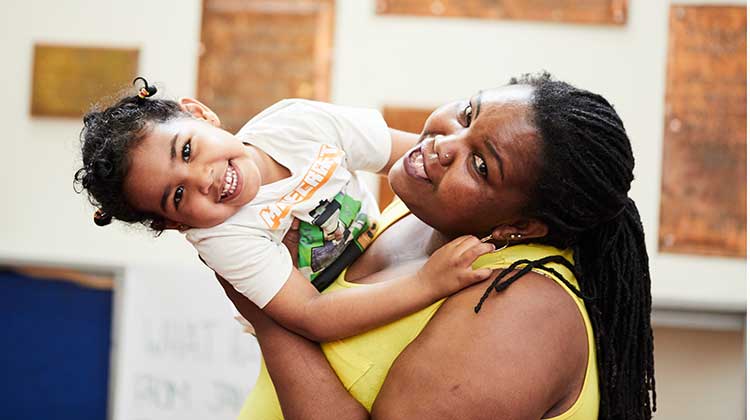
The design process and workshops
Workshop 1: An introduction to co-production and relationship-building
Workshops 3 and 4: Designing the grant fund structure
Workshop 5: Co-designing the Monitoring, Evaluation and Learning (ME&L) Framework
Workshop 6: Finalising the grant design and planning future steps
Workshop 7: Evaluating the co-production process using the most significant change method
How did co-producing the grant fund impact the project and everyone who took part?
Introduction
Buttle UK, The Smallwood Trust and Turn2us are three national organisations dedicated to supporting individuals and families facing financial insecurity. Since 2021, we have partnered with community organisations and local women with children to address the root causes of gendered and child poverty in Middlesbrough.
We believe that communities are best positioned to make decisions about the support they need, and that our projects will be more effective if they are owned by the communities they are designed to serve. Co-production means working with people with lived experience of financial insecurity – we call them our co-production partners – to design and deliver solutions to the issues they identify in their communities.
Co-production can shift power to these communities and help people build their skills, support their personal development and boost their confidence. It also makes sure that community projects have the most impact as they properly reflect what residents want.
This report is intended for grant makers and community and voluntary-sector organisations who might be interested in co-production or co-producing local grant funds.
In this report we outline how we went about co-producing our grant fund and the impact of co-production on the grant fund itself, the women who co-produced it and learning and recommendations for Buttle UK, the Smallwood Trust and Turn2us.
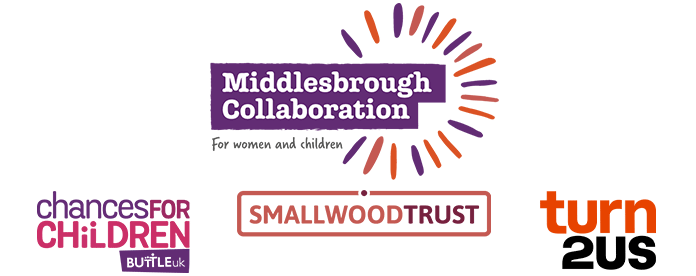
Executive summary
After meeting with Ubuntu Multicultural Centre and Creative Minds Middlesbrough, it became clear they would be excellent co-production partners for our first project. We discussed how we would work together and designed activities that built trust between everyone.
We soon had a co-production group of 16 local women from African, Indian and South Asian backgrounds. They were very diverse in terms of age, education and work experience, and they all had children aged between five months and 22 years. They had been through the asylum and migrant systems and had suffered financial insecurity.
From January to July 2023, we ran seven workshops to co-produce our first project, a local grant to support women and their children in Middlesbrough. The sessions covered everything from relationship building and understanding child poverty to designing the grant fund structure and evaluating the co-production process.
During the workshops, our co-production partners told us that the process had helped them gain greater self-confidence, feel more connected to their communities, feel empowered to make decisions about the project, and learn more about the support available to them.
The design process and workshops
In September 2022, we ran two community-engagement sessions to find out if women with children in Middlesbrough would like to be co-production partners on a grant project.
We discussed how we could work together, we built relationships with local organisations to discover whether the Middlesbrough Collaboration could add value to community projects, and we designed activities that fostered trust between everyone.
We also identified which groups of women were most affected by gendered and child poverty and discussed how to ensure these women were represented among our co-production partners.
Following these sessions, we designed infographics explaining the grant-making and co-production processes. We also organised drop-in sessions where local women could learn more about the project.
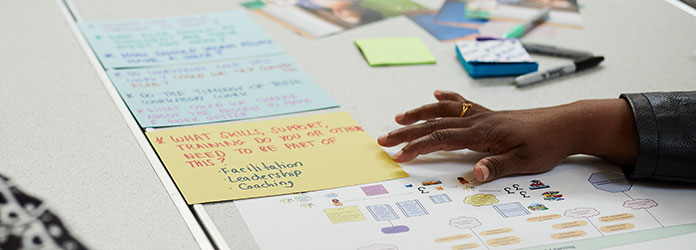
Workshop 1: An introduction to co-production and relationship-building
The first workshop focused on how the group could work together and make key decisions. Its objectives included:
- Building trust and connections.
- Explaining what is meant by co-production and participation.
- Agreeing how everyone would work together.
- Generating excitement about working on the project.
- Hearing about the work of the funding organisations.
Fifteen women from Creative Minds and Ubuntu Multicultural Centre attended the session. Representatives from Turn2us, Buttle UK and the Smallwood Trust introduced themselves and outlined the work undertaken by each organisation.
External facilitators from Thrive Teesside then led the discussion around co-production/participation, which included sharing ideas, getting involved, commitment, respect, confidence and the importance of teamwork.
The women felt that poverty in Newport, Middlesbrough, was caused by a range of issues from childcare to the current cost-of-living crisis. However, the concept of co-production was difficult to grasp for some of the women, partly because they did not see themselves as having a role in designing the programme.
Mapping out the journey using visuals and a timeline might have helped everyone understand the concepts more easily.
Workshop 2: Understanding the causes of gendered and child poverty, and the financial interventions that can help
The focus for the second workshop was identifying the causes of financial insecurity experienced by the women and their children.
During the workshop, we wanted to ensure that:
- The women knew what to expect from the upcoming sessions.
- They understood the causes of financial insecurity.
- They knew what grants were, as well as what they could and could not help with.
- The women had an enjoyable and empowering experience that built trust and helped them gain confidence.
Thirteen women attended the session. Everyone agreed that they would work together to help other women in the local area become financially secure. We agreed that the foundations for this commitment were based on passion, respect, confidence, communication, sharing ideas, learning and teamwork.
The women learned that co-production simply involves working together to solve a problem, which, in this case, is not having enough money each month to cover childcare, food, bills, rent, travel or any other living costs.
Many of the women told us they did not have enough money to cover all their expenses, so we explained that we wanted to give grants to women in their community.
This financial support could be used for basic living costs – such as baby food and clothes – as well as more complex outgoings like paying for citizenship documents, joining courses to learn new skills or making home improvements.
The women also discussed how cultural issues occasionally prevented them from managing their finances, including how some of the women’s partners expected them not to work.
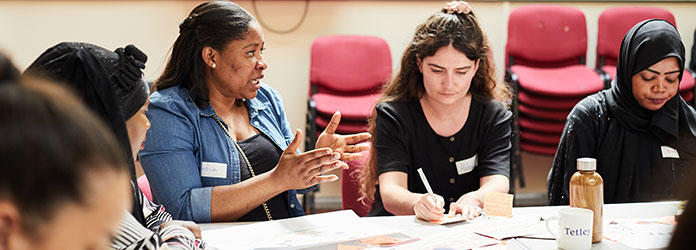
Workshops 3 and 4: Designing the grant fund structure
These two workshops focused on understanding what grants could and could not help with. Together we agreed how we would make decisions as a group, what would happen if we disagreed, decided how the programme would be delivered, and agreed to design a fun, creative and empowering experience that built trust and confidence.
On their decision-making process, the women opted for secret voting regarding their ideas, testing the most prominent ideas, identifying common themes, respecting each other’s ideas and voicing their feelings or disappointments to the group.
They felt that single mothers, asylum seekers, elderly or disabled women, those on benefits, those in abusive relationships and women with few or no qualifications were most in need of financial support.
They wanted grant applications to be simple to complete, inclusive and safe. They also felt that small sums of money would not have the desired impact. They believed that larger sums of £500-£1,500 could be spread over more than one grant, but everyone was aware that giving away too much money could create a dependency on grant funds.
The fourth workshop also covered financial education, which included how to save money, how to invest any spare cash, how to spend/shop wisely, and how to access all the benefits they might be entitled to. This fed into how poverty could be tackled in the longer term.
During this process we learned that the high cost of living is clearly affecting people’s ability to provide for their families.
We spent time sharing knowledge of what help was available including how to access grants and state benefits. This is especially important for those who do not have enough money to pay for their basic living expenses.
In the group discussion, the women felt that people should have to provide some evidence of their finances on their grant application. This was challenging because we wanted to believe applicants’ stories rather than demanding they prove their financial situation to us.
It was also apparent that it could be difficult to gauge the programme’s success and how the grant made people feel. Could these impacts be measured, for example?
Workshop 5: Designing the grant fund eligibility
The aim of the fifth workshop was to establish grant-eligibility criteria and design the grant model and delivery method.
We want people to be able to sustain their financial independence in the long term because this empowers them to take control of their lives, improves their mental wellbeing, helps them maximise their potential and gives them confidence to reach their goals.
The co-production partners designed a two-stage grant fund that would give an initial £500 for essential needs like providing food and clothes for their children, followed by a further £1,500 to help families meet their bigger costs, such as clearing small debts and paying outstanding bills, joining a local gym or other sports club, seeing their family, or even taking a holiday.
After the second grant, they would hopefully be able to achieve a level of financial independence, using the financial-literacy knowledge they had learned to ensure the grant’s positive impact would be felt for longer.
This would have the added benefit of reducing stress, it would mean they would not have to ask their partner for money, and it could even contribute to better mental health and improved sleep. These could all be measured through anonymous surveys, as well as interviews and focus groups, with the results shared via a report.
However, it became clear from group discussions that financial help could not address racial profiling or other forms of discrimination, as well as sickness, being over- or underqualified for jobs, overcoming the limitations of the local economy, changing their immigration status, or fighting for their rights as women.
In the future, the women wanted to carry on meeting as a group and running community workshops, as well as canvassing other women to see if they wanted to be involved in the programme.
They wanted to learn more about the barriers to participation, to be clear on the objectives for the next phase, to stay focused on empowering women through peer support and financial help, and to understand all of the resources available to them.
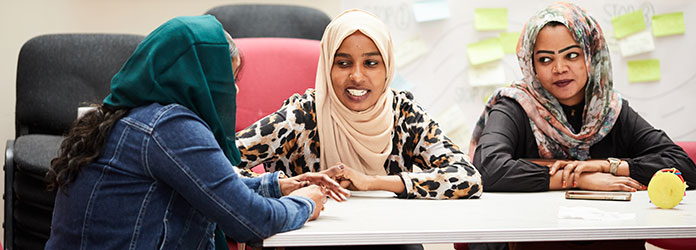
Workshop 6: Finalising the grant design and planning future steps
This workshop focused on reviewing the final process for providing financial support and then evaluating the project through focus groups and interviews.
The women said that they had enjoyed achieving something meaningful together, they had learned valuable information with the help of others, they had met new people and they had discovered how to access financial support.
Workshop 7: Evaluating the co-production process using the most significant change method
The final workshop focused on how to add value to what already existed/worked in the community. The women also reviewed and celebrated what they had achieved during the seven-month programme.
They felt that they had reduced their social isolation, gained confidence, learned about the tremendous value of collaborative co-produced projects, started to understand the causes of financial insecurity, and had been empowered to make their own choices to help them achieve financial independence.
How did co-producing the grant fund impact the project and everyone who took part?
During the grant-funding process and our evaluation, we learned many valuable lessons about gendered and child poverty, working in collaboration with co-production partners and delivering a successful programme. Our key findings include:
- Gender inequalities in income, education and employment opportunities directly impact the socio-economic outcomes and wellbeing of children.
- Pooling the funding between the three charities significantly increased the budget and allowed us to address more issues and deliver meaningful solutions, although managing these funds was a challenging process.
- Effective collaboration allowed us to draw on our combined skillsets, connections and experience to address, for example, other inequalities like ethnic background or disabilities and create a more effective and inclusive programme.
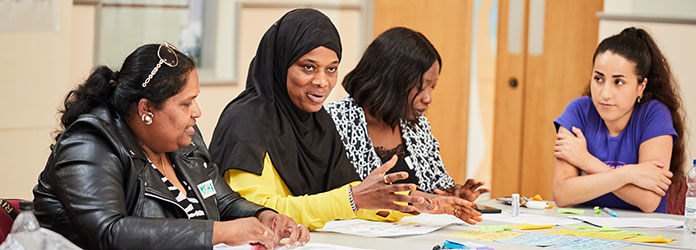
The ‘most significant change’
In the final workshop we asked the women and our community partners what the ‘most significant change’ for them had been in taking part in the co-production process.
When the group were given responsibility for many key decisions, including those governing eligibility, the grant model itself and the method of delivery, this gave them a sense of empowerment and allowed them to take ownership of the project.
After working in co-production, the group also felt more confident that they could help deliver lasting change in their community, as well as learning what financial and wider support from different community organisations was available to them.
They also learned about the best places to shop, which helped them save money.
Every member of the group was paid £62 for taking part in each session. The women felt that being paid for their time meant that their input and expertise was valued and some mentioned that this payment had a big impact on their sense of financial security.
In the future, the group felt it would be good to keep meeting and trying to attract more women to the project, even though this would mean overcoming barriers to participation.
They felt that it was important for everyone to arrive on time and contribute to the sessions. And they believed that having more visual aids and a detailed explanation of the timeline would have helped them understand the process sooner.
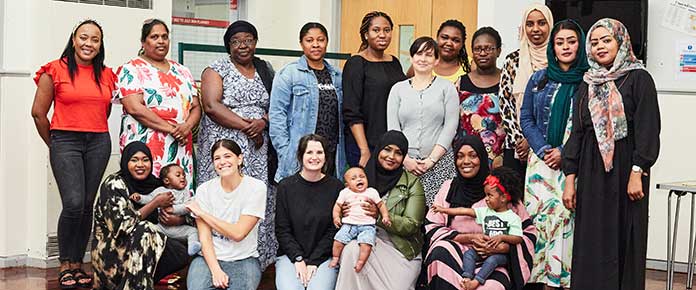
Learnings and recommendations
We learned a great deal during the co-production process about delivering a community-engagement programme and how to encourage participation among the women.
1. Co-production partners should be able to apply for the fund or programme.
We believe it would have been unfair to involve the women in the design process as co-production partners but then exclude them from applying for grant support, especially given their financial insecurity.
Allowing them to apply made the impact of participation more tangible, as well as helping to build trust in the process. This inclusivity ensured that the co-production process felt genuinely collaborative.
We learned, however, that we needed to think carefully about how having co-production partners apply for the grant might skew what we learned about the impact of the grant. For example, co-production partners may be more invested in the grant being successful so may be more inclined to be positive.
2. We should consider alternative methods of compensation.
Some of the co-production partners were concerned that receiving payments for their involvement could affect their entitlement to state benefits. We spent time discussing the impact with them but it remained a challenge.
We learned we would need to be flexible on how we paid different women, which might require extra resources.
3. We should be propositional when engaging with communities who are new to grant-making.
Some of the women were unfamiliar with designing co-produced projects and grant-making and some of our co-production partners wondered why the three charities couldn’t just design the grant fund themselves; they could not see why their input mattered. This made the build-up to the project and the first workshop quite challenging.
In the next workshop we decided to share concrete examples from previous projects to make these concepts more accessible. This helped demystify the process and encouraged the women to participate in the sessions.
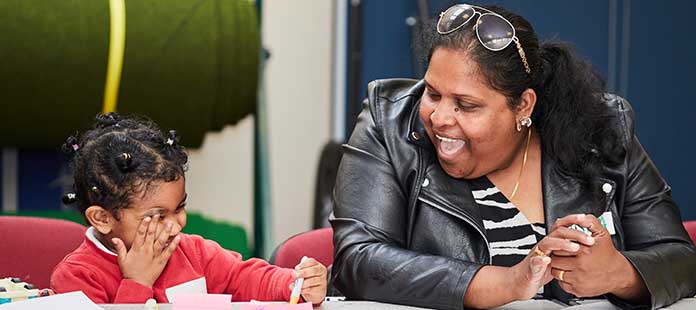
4.Co-production should benefit both the process and the co-production partner.
Co-production helped ensure that the grants we made in Middlesbrough were designed to help women and children who were most financially insecure. Working in co-production meant that community organisations and local residents got to know and trust us, which made it more likely that they would apply for a grant.
Beyond their involvement in co-producing the grant fund, we encouraged our local co-production partners to engage in networking opportunities with other funders to boost their skills and confidence.
Several participants then spoke at the All-Party Parliamentary Group on Universal Credit, giving them a voice in discussions on policy and support. It was important that the women could see that their contribution to the programme design added value, although we could have employed more visuals to highlight their journey.
5. We should be propositional from the beginning.
Shifting power to communities is at the heart of our approach and we want to be led by local residents and community organisations. This meant, however, that we approached our local partner organisations with a totally open remit of what we could do together.
This wasn’t very helpful because it meant that our community partners didn’t have a sense of what might be possible. Being more propositional from the start would have been helpful as long as we built in enough space and trust to ensure that community partners felt able to push back on our ideas.
Our goal is to empower individuals and communities, but an open and flexible approach can deter local organisations that may lack the capacity, time or resources to handle uncertainty.
Once we set clear parameters, such as specifying that grants were only for women with children, this helped manage expectations and align the group’s efforts.
Additionally, being transparent about budget constraints and grant limits helped drive discussion and planning.
Buttle UK, the Smallwood Trust and Turn2us run a lot of co-produced grant funds, so we could have saved time by trusting our own experience in this field and making decisions about the grant fund in advance.
This could have included outlining the eligibility criteria (which we wanted to be broad) and listing the evidence required to apply for the grant (which should be minimal). This would have allowed us to focus the co-production sessions on the places where the lived experience of women and children would have made them ideal targets for a grant.
6. We should be clear about the limitations of the grant fund or programme.
The workshops mapped out the causes of gendered and child poverty, as well as identifying what financial support could address and what it could not.
This guided our grant design and also helped us be honest about what else might be needed to achieve financial security for women and children. It also helped us design spin-off activities, including afinancial-education programme, which one of our co-production partners requested.
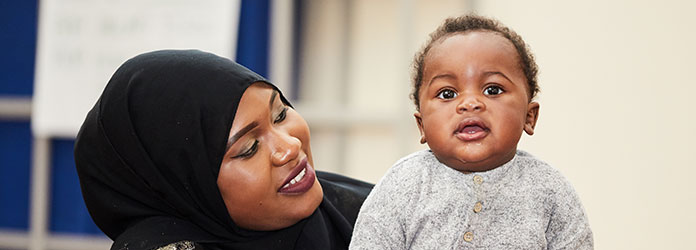
7. We should allow sufficient time to build strong, trusting relationships with local partners.
Building relationships with local organisations takes time and effort. We soon discovered that being physically present in a region was important, especially in Middlesbrough where a lot of community work is conducted face to face.
While we might not receive immediate replies to our emails, it’s important that we make the effort to be visible in the community and engage with local people.
As mentioned above, we could have used the time in the co-production workshops more efficiently. The seven four-hour workshops covered the design and implementation of the grant fund, but this did not give us enough time to discuss and then refine the programme.
We also didn’t manage to cover completing the application forms or answer all the questions raised during the workshops.
We therefore missed the opportunity to ensure the application process was fully understood.
8. We need to have clear agreements in place.
It is essential to have well-defined roles and responsibilities with local and coproduction partners in place before entering workshops because the relationships are then accountable.
This also needs to come with discussions about capacity so we are clear what capacity will be made available to support collaborative projects, including timescales of how and when things will be agreed.
This is also true of the co-production process so that community partners, co-production partners and other staff are all clear what is expected of them in advance.
9. It is important to consider sensitivities over ethnic background and language.
To overcome language barriers, it would have been helpful to have more facilitators from the same ethnic backgrounds as the women. Having translators demystify some of the jargon/technical language would also have helped build trust in the process.
Everyone delivering the programme should also be mindful of the language they use, especially when discussing delicate issues like poverty.
In some cases, using words like ‘disadvantaged’ can be more appropriate.time to discuss and refine these elements with the co-production partners
We extend our gratitude to our co-production partners, and community partners, Ubuntu Multicultural Centre and Creative Minds, for generously sharing their insights and experiences on the systems that contribute to financial insecurity for them, their families and their communities.
Further reports from our Middlesbrough collaboration
An evaluation of our co-produced grant fund for women and children
Understanding what causes poverty for women and their children in Middlesbrough